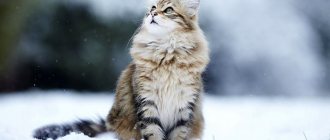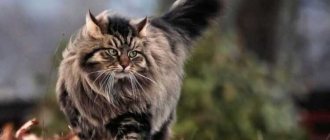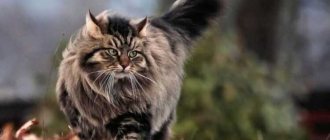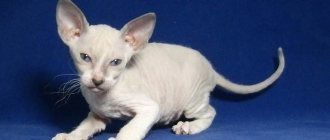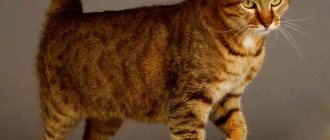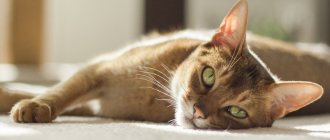History of the origin of the breed
There are many rumors and myths surrounding the origin of the Siberian cat breed. According to some sources, Siberian cats appeared in the Siberian taiga, due to which they have some features of their appearance that helped them survive in difficult climatic conditions.
The Siberian cat is a native long-haired breed and owes its characteristics (appearance, character and endurance) to nature. It is believed that the ancestors of this cat were wild steppe (forest) Siberian cats - predators who are excellent hunters.
The standard for a Siberian cat was determined not so long ago - in the early 90s. Breeders have identified special features of how to identify the breed. They studied what a Siberian cat should be like and gave a detailed description: what it looks like, what its characteristic features are, what its character is and what other features it has.
Read how to care for kittens.
How to care for a Siberian cat
The maintenance of the Siberian beauty is not much different from other felines. He can take care of his fur coat on his own. Therefore, brushes and combs are used only during the shedding period. Long hair sheds within 10 days. The animal can be easily toilet trained.
You can wash the beauty only with a special shampoo, so as not to spoil the fur coat. He does not like to swim, so this should only be done when necessary. Caring for a Siberian cat does not imply having a special diet, since the animal is practically omnivorous.
What to feed a Siberian cat
During feeding, the Siberian cat will not refuse a good piece of meat or fish. However, he is not at all opposed to eating cucumbers and olives. Lean meat, beef and poultry, seafood, and low-fat dairy products are suitable for your daily diet. If the Siberian cat is castrated or sterilized, it is best to add dry food such as Royal Canin to the food.
Health
The Siberian cat breed is distinguished by its enormous endurance. They rarely complain about their health. The biggest problem may be their susceptibility to obesity. Therefore, you should not allow your pet to steal food from the table. You should also monitor the condition of your ears.
How long do Siberian cats live?
The life expectancy of Siberian cats is quite long. They live at home until they are 18 years old. The normal age for Siberians is 16–19 years. If you take good care of it and do not overfeed it, the Siberian cat will live up to 21–22 years. The Siberian cat has been living for 25 years already.
Breed standard (appearance):
The first way the Siberian cat differs from others is its size and weight. A powerful, stocky body with fairly well-developed muscles makes these cats majestic. Muscle mass in Siberian kittens takes a long time to form, like in humans, up to 3 years.
The front legs are slightly shorter than the hind legs, which makes the cat's spine slightly sloping (this is what gives the animal strength and agility). The average weight of an adult Siberian cat is 6 kilograms, a male cat is 12 kg.
“Siberians” have large, muscular paws, which distinguish them from other cats by the fact that there are quite long tufts of hair between their toes.
The long hair of the Siberian kitten is hypoallergenic, which makes this cat an indispensable pet for people with allergies. The coat of cats of this breed consists of two layers: a very thick undercoat and a hard coat that practically does not get wet. Thanks to this “coat”, cats feel comfortable in all weather conditions and temperatures. The head of a cat of this breed is quite large, round in shape, and the neck is short but strong. The muzzle has a trapezoidal shape. On their ears you can see tassels inherited from their ancestors.
The eyes are oval in shape, medium in size and slightly slanted.
The color of a Siberian cat can be completely different, as evidenced by the pictures (photos) that you will see below.
Character and some features
The origin of the cat makes itself felt. The Siberian cat is an excellent hunter. Her hunter's instinct is so developed that she will not disappear in any “extreme” conditions. She will dexterously catch not only a mouse, but also a rabbit. This same hunting instinct makes a cat similar to a dog. She (happily) brings things in her teeth. Based on this data, you will know how to name and choose a name for a kitten, a selection of beautiful nicknames.
Fearlessness. “Siberians” protect their space, do not allow outside animals and people in, informing their owners that “strangers” have arrived. They are not at all afraid of dogs, people, or anything that scares ordinary cats (sharp noise, the hum of cars, sirens...).
Learning ability. The Siberian cat is smart and obedient. She can be trained to a certain place for the toilet.
Intelligence, prudence. A cat will never climb anywhere without making sure that it is safe. Before getting a toy out from under a chair (wardrobe, bed), she will think carefully about how to do this.
Siberian cats are not picky. These cats will play with any object (toy, paper, thread...) that is offered to them. Passion for heights. Don't be surprised to see a cat on a refrigerator, cabinet or high up in a tree, as this is completely normal for them.
Restraint towards people. Siberian cats are affectionate, but reserved. They will not constantly ask to be held, but they will never leave their owner when he is ill (sick, upset about something). They will not adapt to their owners, since they themselves consider themselves such. A Siberian cat will be friends with its owner only if the owner respects him.
Health and immunity are much stronger than those of their counterparts. Life expectancy is on average 15-20 years.
Offspring. Siberian cats can give birth to 5-9 (rarely) kittens. The reproductive age of a cat can last up to 18 years, a cat - only up to 11.
Character of Siberian cats
The Siberian cat is rightfully a Russian folk cat, distinguished by a strong and independent character. These cats are well aware of their sense of dignity. They are quite affectionate and sensitive for their owner, to whom they get used to very quickly and for a long time. These cats can become good friends for people who will respect their animal.
The Siberian cat, the description of which also speaks about its character, recognizes only one owner, becoming strongly attached to him for life.
Because of their independence, cats can behave differently depending on their mood. They never adjust, and if they are in a bad mood, they are unlikely to allow themselves to be petted. At the same time, if the mood is good, the pet will happily purr on the owner’s lap. In general, the Siberian kitten has great mobility, it is playful and unpretentious.
Despite its large size, the Siberian cat is quite active and moves well, moving from place to place. Don't be surprised if your cat starts jumping from a high cabinet or from a chair to a sofa. She has excellent control of her body, and her large soft paws will soften her fall.
The Siberian cat, the description of which is presented in the article, is a real hunter. Moreover, cats use this perfectly preserved instinct whenever possible. This is especially useful if the cat lives in a private house. You can definitely forget about mice there. In rural conditions, the Siberian cat is also not averse to walking around the area. Her prey can be rodents and rabbits, which she will happily bring home to show off to her owner. This cat can even be used to greet guests. She will always warn the owners in advance that someone is behind the front door.
Non-aggressive, calm, but at the same time vindictive, dependent on mood. These cats rarely give their voice, preferring to convey their wishes with meaningful glances.
Cats have unsurpassed prudence. Often their appearance becomes especially proud. Compared to the bottom and top, pets will, of course, prefer height. Noisy games are one of the favorite activities that they (if they are in the mood) engage in with their children.
The Siberian kitten is a cute, wonderful pet for the whole family. He is so attractive that you can admire him endlessly. It is no coincidence that the Siberian cat, its photos are very popular on the Internet. The pet learns its name quickly, and, as a rule, there are no problems with this.
Care and maintenance
- Cats can take care of their fur on their own, so their owners only need to comb it occasionally: during the molting period (about 10 days) and constantly (1-2 times a month is enough).
- If we talk about nutrition, feeding these cats is not difficult. The fact is that this breed has a genetically programmed program for natural and varied food, which makes it easier to choose feed and food products for them. There is only one feature that is important to consider when feeding Siberian breeds - the amount of protein (during growth). Considering the fact that a kitten’s muscles are formed by the age of 3, its nutrition during these years should be predominantly protein (about 70%).
- Do not forget about their love of freedom and periodically release them into the wild.
Video
Proper nutrition and health
Since this cat grows for a long time - up to five years, its diet should be properly balanced and rich in protein. In urban environments, it is advisable to use super-premium dry food with a daily treat in the form of raw chicken meat - heads and necks are suitable.
To avoid the risk of your pet getting intestinal infections, meat should be thoroughly frozen and washed with running water.
Until the age of six months, the kitten is fed five times a day, then transferred to two meals a day.
Cats of this breed were formed as a result of long natural mutations, naturally. Therefore, they do not have genetic or other species-specific diseases.
The few cases of congenital defects in appearance are explained either by a mismatch of parental genotypes or by random factors.
A good appetite, especially in urban conditions, when the cat lacks physical activity, sometimes leads to obesity. You should carefully monitor your pet's diet.
Otherwise, the requirements for maintaining your pet’s health are the same as for other breeds:
- deworming for helminths every three months;
- timely treatment for external parasites, especially important for walking cats;
- Vaccinate annually against rabies and known viral infections.
Photos of Siberian cats
If you don’t want to waste time loading stories, you can look at the photographs of the Siberian cat, which show various color options:
- blue
- Neva Masquerade
- red (which has a golden tint)
- white
- silver
- black
- tricolor
- tortoiseshell
Conclusions about the breed
The Siberian soul hides in the powerful body of a Siberian cat. The friendly and open creature has retained many of the habits of its ancestors - a love of hunting and natural observation. There are legends about the intelligence of these cats - Siberians do not need to be taught tricks and miracles of training, they themselves, by observing people, begin to understand what they want from them.
The Siberian cat is a wonderful companion who knows how to maintain self-esteem. They have a very developed sense of home and in this quality Siberians are close to dogs. Fearlessness is also their trait. What scares an ordinary cat will only amuse a Siberian cat. Siberian cats are silent and you won’t get any unnecessary sounds from them.
The Siberian cat has no hereditary diseases.
Reviews from Siberian cat owners
Konstantin : “A stuffed animal weighing 9 kilograms – that’s all about our Masik. The cat we got was extremely friendly. Despite the fact that we took him in as an adult, Masik somehow quickly adapted to our family and today the family can no longer imagine itself without this Siberian. Masik is kind and playful - when he is bored, he finds a mouse toy hidden somewhere, brings it into the room and moves his paw with a tender expression on his face. He has become a dad more than once and I must say that all the children adopted his best qualities.”
Albina : “We raise our Siberian cat from a young age - when we adopted the kitten, he was only a month and a half old. Then it was a scratchy ball of fur and nothing has changed in three years. Unfortunately, our cat never learned to play without claws and we all walk around with scratches all year round. The Siberian cat is vengeful and does not forgive even accidental insults. If you accidentally hit a cat, then rest assured that in about 15 minutes he will jump out at you from around the corner with his claws at the ready. But he sleeps so beautifully with his belly up - for this sight we forgive him all his shortcomings! "
Gleb : “Lexus requires special tuning. Lexus is my cat, which requires only the most expensive sausage, only fresh meat and only collective farm sour cream. For these riches, he is ready to pay me back, firstly, with vigorous runs around the apartment at 5 o’clock in the morning, and secondly, with a sofa wonderfully tousled by his claws. Despite its size, Lexus is cowardly, cunning and at the same time very charming. He is friends with me and my son, tolerates his wife and mother-in-law - a real man!”
Where to buy a Siberian kitten?
You can buy Siberian kittens at a nursery or from a breeder. The cost of a kitten is influenced by many factors (pedigree, color and other features). The lowest price for a purebred Siberian cat will be about 5 thousand rubles (1,200 UAH), the maximum cost can reach 20 thousand rubles (8,000 UAH).
Where to buy a Siberian kitten? We invite you to pay attention to the following nurseries, the reviews of which are only positive:
- Cattery of Siberian cats “Dauria” (https://www.dauriacats.ru/about.html) and nursery “Gloria” in Russia, Moscow.
- Nursery “Girasole” (https://girasole.by) in Belarus, Minsk.
- Nursery “Zaimka” (https://zaimka.com.ua/) in Kyiv.
Choose a fluffy kitten from any nursery or breeder and you will not regret having a Siberian cat as your friend.
At what age can you take a Siberian cat kitten to a new home?
- German Shepherd
- What kind of snakes are kept at home?
- Ancient dog breeds
- Dog's sense of smell
- Maine Coon
- Domestic iguana
Siberian cats can be transported to a new owner's home only when they are three months or more old. Until this age, kittens urgently need to communicate with their mother and feed her very healthy milk. Being near her, young Siberians learn useful skills, including eating solid food, lapping, using a tray, scratching post, and communicating with other cats and people. Also, before the third month of life, primary vaccination, sterilization or castration are completed, which new owners will not have to think about. Raising small kittens without experience is always dangerous for the life of the animal. Many breeders prefer to pass on high class Siberians at the age of 4 months.


